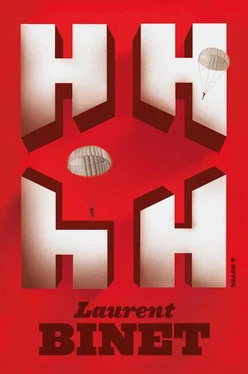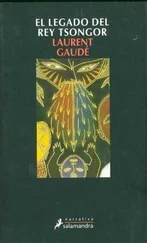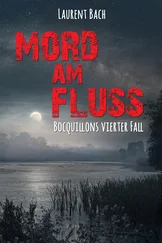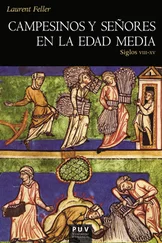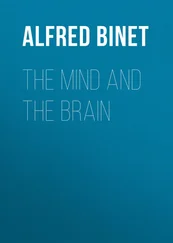His past finally catches up with him in the 1980s, however, and in 1991 he is charged with crimes against humanity.
The investigation ends two years later when he is shot in his own house by a madman. I vividly remember seeing that guy give a press conference just after killing Bousquet and just before the cops arrested him. I remember how pleased with himself he looked as he calmly explained that he’d done it to make people talk about him. I found that utterly idiotic.
This ridiculous moron deprived us of a trial that would have been ten times more interesting than those of Papon and Barbie put together, more interesting than those of Pétain and Laval… the trial of the century. As punishment for this outrageous attack on history, this unimaginably cretinous man was given ten years; he served seven, and is now free. I feel a great repulsion and mistrust for someone like Bousquet, but when I think of his assassin, of the immense historical loss that his act represents, of the revelations the trial would have produced and which he has forever denied us, I feel overwhelmed by hate. He didn’t kill any innocents, that’s true, but he is a destroyer of truth. And all so he could appear on TV for three minutes! What a monstrous, stupid, Warholian piece of shit! The only ones who ought to have a moral right to judge whether this man should live or die are his victims—the living and the dead who fell into the Nazis’ claws because of men like him—but I am sure they wanted him alive . How disappointed they must have been when they heard about this absurd murder! I can feel only disgust for a society that produces such behavior, such lunatics. Pasternak wrote: “I don’t like people who are indifferent to truth.” And worse still are those bastards who are not only indifferent to it but work actively against it. All the secrets that Bousquet took with him to his grave… I have to stop thinking about this because it’s making me ill.
Bousquet’s trial: that would have been the French equivalent of Eichmann in Jerusalem.
Anyway, let’s talk about something else. I have just discovered the testimony of Helmut Knochen, appointed chief of the German police in France by Heydrich. He claims to reveal something that Heydrich told him in confidence and which he never repeated to anyone until now. His testimony dates from June 2000. Fifty-eight years later!
Heydrich supposedly told him: “The war can no longer be won. We must reach a negotiated peace and I am afraid that Hitler can’t accept that. We must think about this.” We are meant to believe that Heydrich reached this conclusion in May 1942—before Stalingrad, at a time when the Reich had never looked stronger.
Knochen sees in that an extraordinary clairvoyancy on Heydrich’s part. He considers the Blond Beast much more intelligent than all the other Nazi dignitaries. He also believes that Heydrich was thinking of overthrowing Hitler. And based on this he proposes the following theory: that the assassination of Heydrich would have been a high priority for Churchill, who absolutely refused to be deprived of total victory over Hitler. In other words, the British would have supported the Czechs because they were afraid that a wise Nazi like Heydrich might remove Hitler and save the regime through a negotiated peace.
I suspect it’s in Knochen’s interests to associate himself with the theory of a plot against Hitler, in order to minimize his own (very real) role in the police machine of the Third Reich. It is even perfectly conceivable that, sixty years later, he actually believes what he’s saying. Personally, I think it’s bullshit. But I report it anyway.
A poster on an Internet forum expresses the opinion that Max Aue, Jonathan Littell’s protagonist in The Kindly Ones , “rings true because he is the mirror of his age.” What? No! He rings true (for certain, easily duped readers) because he is the mirror of our age: a postmodern nihilist, essentially. At no moment in the novel is it suggested that this character believes in Nazism. On the contrary, he displays an often critical detachment toward National Socialist doctrine—and in that sense, he can hardly be said to reflect the delirious fanaticism prevalent in his time. On the other hand, this detachment, this blasé attitude toward everything, this permanent malaise, this taste for philosophizing, this unspoken amorality, this morose sadism, and this terrible sexual frustration that constantly twists his guts… but of course! How did I not see it before? Suddenly, everything is clear. The Kindly Ones is simply “Houellebecq does Nazism.”
I think I’m beginning to understand. What I’m writing is an infranovel .
The moment is getting closer, I can feel it. The Mercedes is on its way. It’s coming. Something floating in the Prague air pierces me to my bones. The twists of the road are spelling out the destiny of a man, and of another, and another, and another. I see pigeons take off from the bronze head of Jan Hus and, in the background, the most beautiful view in the world: Týn Church with its sharp black turrets, whose gray and evil-looking façade is so majestic that it makes me want to fall to my knees every time I see it. The heart of Prague beats in my chest. I hear the bells of the tramway. I see men in gray-green uniforms, hear their boots clicking on the cobbles. I’m nearly there. I have to go. Yes, I must travel to Prague. I have to be there when this happens.
I have to write it there.
I hear the engine of the Mercedes as it glides along the road. I hear Gabčík breathing, wrapped up in his raincoat, waiting on the pavement. I see Kubiš standing opposite, and Valčík posted at the top of the hill. I feel the smooth cold mirror at the bottom of his coat pocket. Not yet, not yet, uz nie, noch nicht .
Not yet.
I feel the wind that whips the faces of the two Germans in the car. Yes, the chauffeur is driving that fast—I know this: a thousand witnesses have attested to it, I have no doubts at all on that score. The Mercedes speeds past, and the most precious part of my imagining follows silently in its slipstream. The air rushes past, the engine drones, the passenger keeps telling his giant chauffeur, “Schneller! Schneller!” Faster, faster, he shouts, but he doesn’t know that time has already started to slow down. Soon, the course of the world will freeze at a bend in the road. The earth will stop moving at exactly the same time as the Mercedes.
But not yet. It is still too early. Not everything is in place yet. Not everything has been said. I would like to be able to delay this moment forever, I think, even as my whole being stretches out longingly toward it.
The Slovak, the Moravian, and the Bohemian Czech are also waiting, and I would pay dearly to feel what they felt then. But I am too corrupted by literature. “Yet have I something in me dangerous,” says Hamlet, at a similar moment. I hope I can be forgiven. I hope they can forgive me. I am doing all of this for them. I had to start up the black Mercedes—that wasn’t easy. I had to put everything in place, take care of the preparations. I had to spin the web of this adventure, erect the gallows of the Resistance, cover death’s hideous iron fist in the sumptuous velvet glove of the struggle. Scorning modesty, I had to join forces with men so great that I am a mere insect in comparison.
I had to cheat sometimes, to betray my literary principles—because what I believe is insignificant next to what is being played out now. What will be played out in a few minutes. Here. Now. On this curve in Holešovice Street in Prague, where—later, much later—they will build some kind of access road. Because cities change faster, alas, than men’s memories.
Читать дальше
